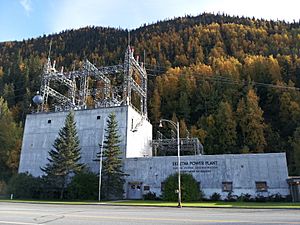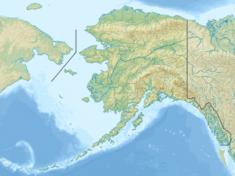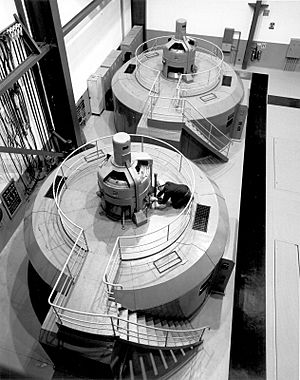Eklutna Dam facts for kids
Quick facts for kids Eklutna Dam |
|
|---|---|

The Eklutna Power Plant
|
|
|
Location of Eklutna Dam in Alaska
|
|
| Country | United States |
| Location | Anchorage, Alaska |
| Coordinates | 61°24′14.78″N 149°9′0.24″W / 61.4041056°N 149.1500667°W |
| Purpose | Power |
| Status | Operational |
| Construction began | Initial: 1927 Raising: 1952 |
| Opening date | Initial: 1929 Raising: 1955 |
| Owner(s) | Anchorage Municipal Light & Power, Chugach Electric, Matanuska Electric |
| Dam and spillways | |
| Type of dam | Embankment |
| Impounds | Eklutna River |
| Height (foundation) | 26 ft (7.9 m) |
| Length | 555 ft (169 m) |
| Elevation at crest | 875 ft (267 m) |
| Dam volume | 5,000 cu yd (3,800 m3) |
| Reservoir | |
| Creates | Eklutna Lake |
| Total capacity | 182,000 acre⋅ft (224,000,000 m3) |
| Surface area | 3,247 acres (1,314 ha) |
| Maximum length | 7 mi (11 km) |
| Normal elevation | 867.5 ft (264.4 m) |
| Power station | |
| Name | Eklutna Power Plant |
| Coordinates | 61°28′30.96″N 149°8′59.73″W / 61.4752667°N 149.1499250°W |
| Commission date | 1955 |
| Type | Conventional, diversion |
| Turbines | 2 x 23.5 MW Francis-type |
| Installed capacity | 47 MW |
The Eklutna Dam is a special kind of wall built across the Eklutna River in Alaska, United States. It is about 30 miles (48 km) northeast of Anchorage. This dam helps create hydroelectric power, which means electricity made from moving water.
The dam supports a power plant that can produce 47 megawatts of electricity. It was first finished in 1929. Over the years, it has been repaired and rebuilt many times. The dam and its power plant are owned by three different companies: Anchorage Municipal Light & Power, Chugach Electric, and Matanuska Electric.
Contents
How the Eklutna Dam Started
The idea for the first dam and power plant came from a businessman named Frank Reed. The Anchorage Light and Power Company built it between 1927 and 1929. It was built on top of a natural landslide dam in the Eklutna Valley. This first dam helped control the river's flow to an older power plant.
Improvements and Growth
The dam was rebuilt and made better in 1941 after the first one broke. Around the same time, many people moved to Anchorage because of World War II. This meant more electricity was needed. The United States Bureau of Reclamation suggested a big project called the Eklutna Project. This project included making the dam taller and building a new power plant.
Building the New Power System
The United States Congress approved this project on July 31, 1950. Construction started in 1951, and work on making the dam taller began in 1952. The first machine that made electricity started working on January 8, 1955. The second one started on April 1, 1955. The whole project was finished by July 1, 1955.
Challenges and Repairs
In March 1964, a very strong earthquake, known as the Great Alaska earthquake, caused a lot of damage to the dam. The part that takes water into the power plant moved. Cracks formed near the dam's spillway, which is where extra water flows out. The dam was not safe, so it was repaired until 1966.
In 1997, the Alaska Power Authority sold the dam and power plant. It was sold to the three electric companies that own it today for $6 million.
How the Eklutna Dam Works
The Eklutna Dam is 26 feet (7.9 meters) tall and 555 feet (169 meters) long. It is made of about 5,000 cubic yards (3,800 cubic meters) of sand, gravel, and earth. The top of the dam is 875 feet (267 meters) above sea level.
Eklutna Lake: The Reservoir
The dam creates a large lake called Eklutna Lake. This lake covers about 3,247 acres (1,314 hectares) and is 7 miles (11 km) long. When the lake is at 867.5 feet (264.4 meters) high, it holds about 182,000 acre-feet (224,000,000 cubic meters) of water.
Power Generation Process
To get water from the lake to the power plant, there is a large pipe called a penstock. This pipe is 9 feet (2.7 meters) wide and about 4.46 miles (7.18 km) long. It starts at the northwest corner of the lake. Water rushes down this pipe to reach two special machines called Francis turbine-generators. Each of these machines can make 23.5 megawatts of power. After the water is used to make electricity, it flows out into the Knik River.
 | John T. Biggers |
 | Thomas Blackshear |
 | Mark Bradford |
 | Beverly Buchanan |



